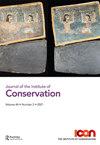文本治疗:被掠夺手稿和《犹大福音》的伦理保护
IF 0.5
0 HUMANITIES, MULTIDISCIPLINARY
引用次数: 0
摘要
摘要通过对《犹大福音》的掠夺、出售、保存和随后出版的案例研究,本文考察了保存被掠夺的手稿是否有任何道德价值。在充分承认掠夺造成的广泛危害的同时,它探讨了考古界的普遍论点,即所有被掠夺的文物都必须被保护人忽视,因为全面拒绝鉴定、保护或研究被掠夺的物品会减少需求及其灰色市场价值,从而防止考古遗址被掠夺。然而,有人认为,这种观点因具有书面内容的文物而变得复杂,保护伦理为保护人员在个案基础上使用知情判断留出了空间,尤其是因为被掠夺的手稿有两种背景:考古和文本。通过研究各种保护人员的经验并应用专业保护伦理,有人认为,保护和出版《犹大福音》等独特、历史悠久且严重恶化的手稿文物的文本内容仍然有价值。保护人需要保留代理权,并维护对物品的注意义务,以帮助解锁和保护具有里程碑意义的文本,只要这是为了尽可能减轻抢劫造成的伤害而负责任地进行的。本文章由计算机程序翻译,如有差异,请以英文原文为准。
Textual healing: ethical conservation of looted manuscripts and ‘The Gospel of Judas’
Abstract Through a case study of the looting, sale, conservation and subsequent publication of ‘The Gospel of Judas’, this article examines if there is any ethical merit in conserving looted manuscripts. While fully acknowledging the extensive harm caused by looting, it explores the prevailing argument in archaeological circles that all looted artefacts must be ignored by conservators, given the logic that the blanket refusal to authenticate, conserve or research looted objects would decrease demand and their grey market value, and so prevent archaeological sites being robbed. However, this view, it is argued, is complicated by antiquities with written content and that conservation ethics leave room for conservators to use informed judgement on a case-by-case basis, especially as looted manuscripts have two types of context: archaeological and textual. By examining the experiences of a wide range of conservators and applying professional conservation ethics, the argument is made that there is still merit in conserving and publishing the textual content of otherwise unique, historic and badly deteriorated manuscript artefacts such as ‘The Gospel of Judas’. Conservators need to retain agency and uphold a duty of care to an object in order to help unlock and preserve landmark texts, so long as it is undertaken responsibly in the service of mitigating the harm done by looting as much as possible.
求助全文
通过发布文献求助,成功后即可免费获取论文全文。
去求助
来源期刊

Journal of the Institute of Conservation
HUMANITIES, MULTIDISCIPLINARY-
CiteScore
1.50
自引率
0.00%
发文量
22
期刊介绍:
The Journal of the Institute of Conservation is the peer reviewed publication of the Institute of Conservation (Icon). As such, its aims reflect those of Icon, to advance knowledge and education in conservation and achieve the long term preservation and conservation of moveable and immoveable cultural heritage. The Journal provides a collective identity for conservators; it promotes and supports both the profession and professionalism. With international contributions on all aspects of conservation, it is an invaluable resource for the heritage sector. The specific aims of the Journal are to: 1. promote research, knowledge and understanding of cultural heritage conservation through its history, practice and theory 2. provide an international forum to enable and disseminate advances in research, knowledge and understanding relating to conservation and heritage 3. champion and support professional standards of heritage conservation in the UK and internationally 4. provide a permanent record of issues relating to conservation and heritage 5. be financially and operationally sustainable. To achieve these aims, the Journal invites contributions from all those involved in the conservation of cultural heritage and related activities. Areas of interest include understanding cultural heritage materials and their degradation; subject reviews and histories of cultural heritage materials and conservation treatments; new, innovative or improved approaches to conservation and collections care theory, practice, communication, management and training; case studies demonstrating new, innovative or improved approaches; and conservation in its wider context. Submitters are encouraged to demonstrate how their work is of practical application to conservation. To maintain professional standards and promote academic rigour, submissions of articles and shorter notices are subject to an anonymous peer review process.
 求助内容:
求助内容: 应助结果提醒方式:
应助结果提醒方式:


